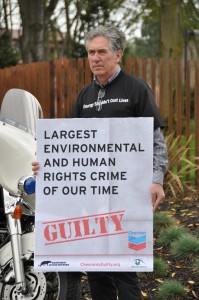 The U.S. federal judge who suggested to Chevron that the company file racketeering charges against the Ecuadorean plaintiffs suing for environmental and cultural damages in the Amazon is again being called out for his prejudicial judgments.
The U.S. federal judge who suggested to Chevron that the company file racketeering charges against the Ecuadorean plaintiffs suing for environmental and cultural damages in the Amazon is again being called out for his prejudicial judgments.
Judge Lewis Kaplan granted a preliminary injunction against enforcement of a verdict against Chevron before the court in Ecuador had even issued any verdict whatsoever, which seemed suspicious enough. Now it has been revealed that Kaplan didn’t even attempt to hide his bias in issuing the decision on March 7th, as he cited Chevron’s evidence 162 times versus only 10 citations of the plaintiffs’ evidence. In other words, Kaplan’s decision was based almost entirely on Chevron’s version of the “facts”, and hardly constitutes a fair and impartial consideration of the evidence presented before the court. As the folks over at The Chevron Pit put it:
Chevron may as well have written the opinion. Judge Kaplan adopted Chevron’s arguments as his own. At the same time, he refused to accept evidence from the plaintiffs…
Kaplan even cited Vladimir Alvarez Grau, a conservative newspaper columnist and political opponent of Ecuador’s President Raphael Correa, some 45 times — which, if you’re counting, is 35 times more than he cited the plaintiffs who, you know, are actually involved in the case, unlike Grau.
But what lays Kaplan’s bias in favor of Chevron even more bare is the fact that the Ecuadorean judge who issued the guilty verdict against Chevron and ordered the company to pay $9.5 billion to clean up its mess, Judge Nicholas Zambrano, relied just as heavily on Chevron’s evidence. The Chevron Pit has the scoop again:
On February 14th, Judge Zambrano awarded the Ecuadorian plaintiffs $9.5 billion in damages against Chevron for the intentional contamination of the Amazon rainforest. He based his judgment on over 60,000 soil and water samples that showed illegal levels of contamination. Over 50,000 of the samples had been taken by Chevron itself, and the rest by the plaintiffs. Judge Zambrano also adopted the conclusions of Chevron’s own expert on the damage costs; Chevron-sponsored consultant Gerado Barros estimated $6 billion in soil and water remediation costs. (The rest of the damage award is for medical facilities, cleaning drinking water and other expenses.)
In other words, Judge Zambrano based his decision mostly on Chevron’s own evidence.
That’s right, Chevron’s own evidence is so incriminating that Zambrano relied on it while finding the company guilty of deliberately dumping over 18 billion gallons of toxic oil waste in the Ecuadorean Amazon. But somehow, despite the overwhelming evidence of Chevron’s guilt – much of which is supplied by the company’s own analysis — Judge Kaplan has consistently ruled in Chevron’s favor.
Curious, no?